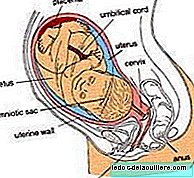
Two days ago, a group of nurses wanted to alert in the Catalan Parliament that the cuts they have made and the social pressure they are subjecting to the population is such that many families have real problems getting food.
Consequently, nurses say, many recent mothers are eating poorly and are therefore forced to stop breastfeeding and go to social entities in search of artificial milk for babies. All my support to my fellow nurses in this task, but I want to emphasize that in his speech there are some errors that I think should be commented. That is why today we answer the question: Can poor mothers breastfeed or should they give artificial milk?
The president of the Catalan Association of Pediatric Nursing, Anna Pedraza, informed the Catalan Government that the cuts are affecting many levels and that because of the disappearance or cutting of many aid programs many women cannot breastfeed their babies.
It is true, it is unfortunate that we are in a country in which the money is distributed in a painful way, allocating a lot of money to defense, to the rescue of banks and to fill the pockets of thieves in white gloves and in the meantime the population is going through misery, have a worse and worse health service and have fewer and fewer educational resources for children (among many other things).
This nurse also says that "These mothers cannot do it (breastfeed) because they lack nutrients. There is talk of malnourished children, but there are also many mothers".
In addition, it is warned that when the period of breastfeeding ends the feeding of children is based on the food they receive from food banks, which is little varied and consequently does not guarantee that they receive all the necessary nutrients. This obviously affects your physical, psychic development and of course your health. Poor nutrition is a perfect basis for having a poor immune system and having a greater tendency to catch diseases.
But poor mothers have breastfed a lifetime
However, we all know that poor mothers have breastfed a lifetime. Even now, mothers in poor countries breastfeed their babies in what is one of the few actions that helps them stay alive.
There, in countries in Africa, where the potability of water is at stake and where many parents prepare artificial milk that is too watery, with less dust than recommended, for the can to last longer, breastfeeding can make the difference between a live baby until at least six months or die before.
"Sure, but here there is drinking water and artificial milk," you will tell me. And yet It is still better for poor mothers to give breast milk to their babies What artificial milk.
As the nurses have commented, when they are not well nourished they continue to produce milk, but with few nutrients, and that is why they have to stop breastfeeding and give artificial milk to be able to feed their babies well, and this is inaccurate.
A 1985 study in Bangladesh compared the breast milk of 60 mothers in a peri-urban area, with nutritional deficiencies, in order to know if they produced a sufficient quantity of milk and if the quality was as poor as their diet.
They saw that all produced enough milk for your babies and observed that women with better nutrition produced a nutritionally better milk, with more fat, energy and nutrients, but concluding the following:
Although mothers were poorly fed compared to internationally reference populations, their breastfeeding capacity was not severely affected.
That is, despite the mother's poor nutrition, the milk was still enough and the valid nutrients to raise a baby, being recommended to improve the nutrition of the mother to ensure the contribution to the baby.
Another study, this one from 1988, concluded that in the case of women there is no exact relationship between breast milk and what a mother eats, since milk is formed based on diet, but also on nutritional reserves, to the reduction of physical activity by the mother, who takes care of her baby and the metabolic adaptation of her body, providing among all this milk production so as to ensure a correct milk supply for the baby
In 1991, based on a review of other studies, and adding their own study, researchers concluded that until then it had been difficult to find women whose milk quality was impaired, or whose production fell to the point of affecting the growth of the children even in women with malnutrition who breastfeed for long periods. However, they did say that seasonal hunger (when, due to lack of crops, mothers barely ate) produces a temporary decrease in the amount of milk produced.
Are the mothers referred to by the nurses in a famine situation?

The question then is this. Because if they are in a situation where they really are not eating almost anything throughout the day they will undoubtedly be malnourished (which is not the same as malnourished), and then the amount of milk produced will be affected.
In such a case a baby may have problems and even then I would give him a bottle of artificial milk. In any case, instead of going to social services to be given that milk, which is bread for today and hungry for tomorrow, I would go asking for food for the mother.
But I don't think that is the case. I do not believe that these mothers really are not eating almost anything, but rather that they are eating a poorly balanced and poorly varied diet, such as that offered to their children when "the period of breastfeeding is over." To what I add, if a baby is in a situation where he receives a little varied diet, because he only eats what he receives from the food banks, well hey, at least don't take away breast milk, which will ensure you receive many nutrients and, most importantly, many immune cells.
Feed the mothers
So, in summary, I only hope and wish that the Catalan and Spanish Government reconsider and that for once they begin to think of ordinary people for something that is not to convince them to vote for them, to offer resources for anyone to pass hunger and that, if the thing goes for long, at least feed the mothers well so that, when they are well, their children are also good.
Remember, in case you don't consider it, that breastfeeding is a protective factor against maternal anemia. While a mother breastfeeds menstruation stops for a while, and hears, if it costs to take nutritionally complete food to the mouth, unless they lack iron for other reasons.











